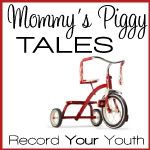This is my guest post today from www.simplemarriage.net.
Which do you think people value more: a financial or non-financial inheritance? Or, to put it another way, if you lost a loved one, what legacy would you want to have from them?
The statistics may surprise you. A few years ago, Allianz Life Insurance Company of North America conducted a survey of over 2600 baby boomers and elders.
According to the survey, participants felt a non-financial legacy was 10 times more important than money and other assets. Think about that; the response overwhelmingly favored a personal heritage over worldly goods, values over valuables.
77% of boomers and elders personally felt values and life experiences were very important parts of an inheritance. How exciting to realize that virtually every single person has the ability to leave a meaningful heritage for their loved ones!
Which types of values are the most important to leave as your legacy? They include your personal values, ethics, religion, memories, heritage, and family stories. Not coincidentally, these values are all elements of an Ethical Will.
While an Ethical Will is non-legal and non-financial, to your family it is priceless.
Leaving a legacy your family will treasure can be as simple as writing them a love letter or capturing your words in an audio or video recording. Whatever you decide to do, here are some of the topics you can include:
• Your History – Past and Present
Remember all the great stories you used to hear when you were a kid? Some of them might have been fantasies, like bedtime stories, but many of them were probably true. For me, the best stories came from favorite family members and friends. I recall everyone sitting around the kitchen table while Grandpa talked about farming, or Uncle Morris told a tall tale about raising pigs. I was fascinated, hanging on their every word. Those are among the stories I want to pass down to my young grandchildren and even to future generations.
Have you started a genealogy or family tree? I love to visualize a bare oak tree with the roots exposed as in this diagram. That forms the heritage and structure of a family, which includes all the dates, places, and names. Now consider all your family stories – those are what flesh out the tree, including the leaves and blossoms that make it interesting. If your family is like mine, those stories flesh out all the fruits and nuts of a family, too. They are the quirky, personal stories that everyone loves to hear.
• Life Lessons and Achievements
Think about your own life. Everyone experiences and responds differently to life lessons. That is why they are such an important element of your Ethical Will. What have you learned during your life, when, and from whom? Your life lessons often shape who you are and who you become.
What have been your proudest accomplishments and why? What can your descendants learn from your successes and missteps? Which achievements by your family have made you proud? How does having confidence in yourself lead you to more successes?
Think about the wisdom you can bequeath to your family. Flesh out your advice with stories and examples. What advice do you want your friends and family to remember? How can you help them in some way?
• Personal Values and Beliefs
Your personal values are unique to you, and they may vary from time to time. Every person responds differently to the influences in their lives and what life dishes out to them. Examining your own personal values allows you to figure out not only who you are, but who you want to become.
Your values are determined by your heart, your family, your friends, your religion, and your community. They may be as ingrained in you as DNA. Consider which personal values and beliefs you want to include in your Ethical Will.
• Hopes for the Future
Voice your hopes for the future, for you, your family, your community, and your world. Which hopes and dreams are most important to you for your vision of the future? What do you look forward to sharing with those you love?
As you start working on your Legacy of Love, relish the thought that your values are more important than any valuables you may leave behind.
To whom do you plan to write your first Ethical Will?
Subscribe to:
Post Comments (Atom)







No comments:
Post a Comment